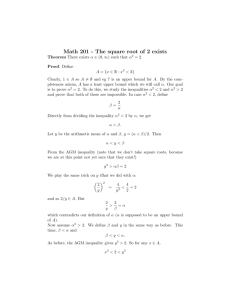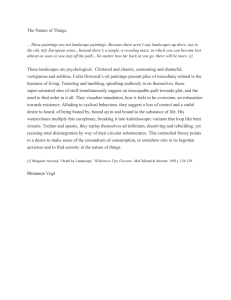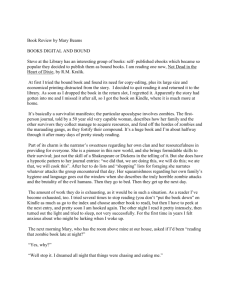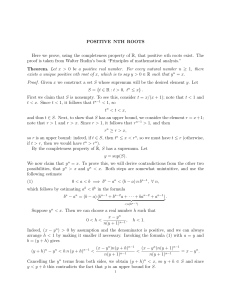Hong Kong Company Law
advertisement
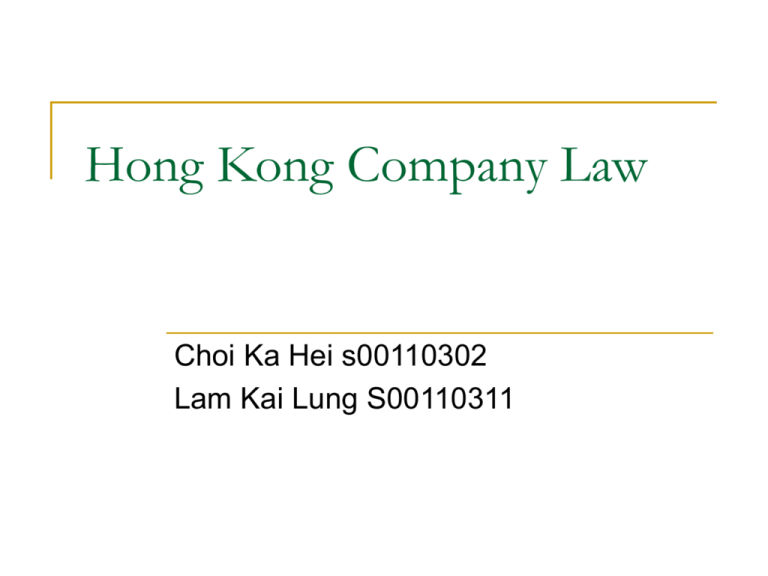
Hong Kong Company Law Choi Ka Hei s00110302 Lam Kai Lung S00110311 Question 1 Please discuss whether the company is bound by Winnie’s actions and that the architectural firm can sue to recover the proceeds. Winnie’s is bound for company action Legally is not the managing director of the company There is no formal appointment She is acting as a managing director with consent of the broad of directors That means she had apparent authority to act as managing director Even though she may be lack of actual authority Hely-Hutchison v Brayhead Ltd [1968] 1 QB 549 It held that he did have authority because the fact that the board had let Mr Richards continue to act had in fact created actual authority. Apparent authority Where the issue of a case whether a director has, or deemed to have, authority to represent the company as its agent A company is bound by the actions of its agent if they are with is apparent authority Must arise from a representation that a director had that authority Whether the architectural firm can sue to recover from proceeds? Outsider is possible to claim that the company is liable for the contract even though the director signed it may not have actual authority Freeman and Lockyer v Buckhurst Park Properties Ltd (1964) This case law summarized that four situation must be fulfilled by outsider to enforce against a company to entitle the contract: 1. A representation was made to contractor and the agent had authority to enter such contract 2. Representation was made by persons who had actual authority to manage business 3. Contractor was induced by representation 4. Company was not deprived of the capacity to delegate authority to an agent to make contract under the article or memorandum 2. Is this a valid contract and if so why? valid contract Companies ordinance section 32 A contract made between individuals are required to be in writing and under seal must be made on company behalf Signed by anybody on his authority on behalf of the company Frederick got the resolution from broad to negotiate contract on behalf of the company. Frederick has signed the contract, and the IT company CEO is also represented and signed it as well. The contract has the consent of both company’s managing director agreement, therefore it is valid contract. If Frederick signed contract without further consultation with broad and sign $1.2M per 4 year period contract, will company bound for contract? Bound by the contract if a transaction is within the power of the company, the company will be bound by the director’s action anyway even if it’d in his authority or not. A transaction that is within the power of the company, rather than director may nevertheless be enforced by third party by virtue. It’s know as the “indoor management rule” which claim a person outside the company is not required in their dealings to a company to inquire internal management and may assume necessary internal requirement has already been complied with. Although Frederick didn’t get authorization from the broad, the IT company is right to assume Frederick got it, so IT company can enforce the contract. If the memorandum and article of association contained clause that all contract exceed $1M must be approved by broad director and that company can only conclude contracts directly relate to the purchase of mining property? Will company bound for contract ? not bound by the contract The indoor management rule, established in the turquand case, does not comply if the third party has actual notice or constructive notice of the fact that the director is acting outside his authority If the article really include clause prohibit director to sign such contract, the IT company cannot enforce this contract because they should have known the restriction by seeing the memorandum Irvine v Union Bank of Australia (1877) PC It was held that the bank cannot recover the full amount of the loan. if the bank had looked at the articles, they would have known that director are acting without his authority They could have avoid these They can’t enforce the indoor management rule Company not liable for contract Question 3 The rule in Turquand case refers to a third-party dealing with a company is entitled to presume the person acting on behalf of the company has the necessary authority to enter into contract. It offered protection to third parties in case the company claimed the director is not acting on behalf of company Royal British Bank v Turquand (1856) 6 E&B 327 The main question is whether the bond was legally binding when the two directors don’t have power to decide how much the company could borrow? The court held that the bond was binding, notwithstanding the director’s failure, because the bank was entitled to assume directors got the permission from the broad Mahoney v East Holyford Mining Co. (1875) LR7 HL869 The court held that the problem in the director appointment is only a matter of internal management, the third party who received those cheque was entitled to presume the directors had been properly appointed and cash the cheque. The End
